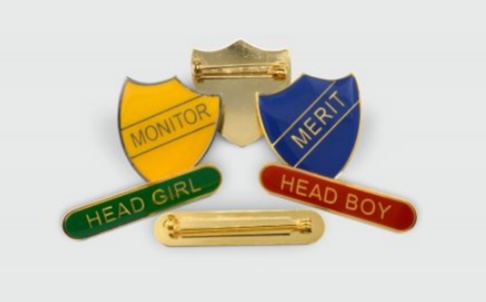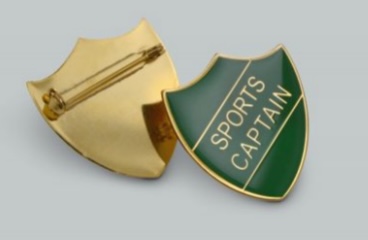Education
From School Spirit to Global Solidarity

Designing Custom Enamel Pin Badges for Schools
Enamel pin badges have become increasingly popular as a means of recognition and personal expression in schools. Whether it’s to acknowledge achievements, promote school spirit, or showcase involvement in various activities, designing custom enamel pin badges allows schools to create unique and visually appealing tokens that students can proudly wear.
Start by identifying the purpose of the badge. Is it for academic achievements, extracurricular activities, or a specific event? Clarifying the purpose will guide your design choices and ensure the badge effectively represents its intended meaning.
Determine the size and shape of the badge based on your design concept and practicality. Consider the visibility of details and ensure the badge is not too small or large for easy display and wear.
Select symbols, imagery, or icons that are relevant to the purpose of the badge. This could include school mascots, emblems, subject-related motifs, or event-specific elements. Keep the design clean and recognizable, avoiding excessive complexity.
Choose colors that align with your school’s branding or the theme of the badge. Consider using complementary colors or contrasting hues to make the design visually appealing. However, be cautious not to overwhelm the design with too many colors. A balanced color palette enhances the overall aesthetic.
Enamel pin badges come in various material options. The two common types are soft enamel and hard enamel. Soft enamel provides a textured, recessed feel, while hard enamel has a smooth, polished surface. Consider the desired look and feel of the badge when selecting the enamel type.
Ensure that the chosen materials are of high quality to guarantee the durability of the badge. Quality materials will prevent fading, scratching, or chipping, ensuring that the badges can be treasured for a long time.
Add finishing touches to enhance the badge’s appearance. This could include features like glitter, glow-in-the-dark elements, or a unique metal plating, such as gold or silver. These extra details can make the badge more visually appealing and eye-catching.
Consider the backing options for the badge. The most common choices are butterfly clutches or rubber clasps. Select a secure and reliable backing that will keep the badge in place when worn.
Create a mock-up or digital rendering of the badges for schools design before production. Share the design with stakeholders, such as students, teachers, and administrators, to gather feedback and ensure the design aligns with the desired objectives.
Promoting Diversity and Representation in Schools
Inclusivity is a crucial aspect of creating a welcoming and supportive environment in schools. Enamel pin badges provide an excellent opportunity for educational institutions to promote diversity and representation by creating badges that celebrate different cultures, languages, or gender identities.Designing enamel pin badges that represent various cultures is an effective way to celebrate diversity in schools. These badges can feature symbols, landmarks, or traditional elements associated with different cultures. By wearing and exchanging these badges, students can learn about and appreciate the richness of other cultures, promoting intercultural understanding and respect.


Language plays a vital role in shaping our identities and fostering inclusivity. Schools can create enamel pin badges that feature phrases or words from different languages. These badges not only showcase linguistic diversity but also encourage language learning and appreciation among students. It sends a message that all languages are valuable and deserving of respect.
Enamel pin badges can also be used to raise awareness and support for students with disabilities. Schools can create badges that represent different disabilities or feature empowering messages. These badges can serve as conversation starters and promote understanding, empathy, and inclusivity among students and staff.
Intersectionality recognizes that individuals hold multiple identities and face overlapping forms of discrimination. Schools can design enamel pin badges that represent the intersectionality of identities, such as badges that celebrate being a person of color and LGBTQ+, or badges that honor students with disabilities who are also multilingual. These badges highlight the unique experiences and contributions of individuals with intersecting identities, fostering a sense of belonging for all students.
Inclusivity can be enhanced by involving students in the badge design process. Schools can organize competitions or workshops where students can submit their ideas for inclusive enamel pin badges. This involvement allows students to express their creativity, voice their perspectives, and contribute to the inclusive culture of the school.
Enamel pin badges can be used as part of broader awareness campaigns focused on promoting inclusivity. For instance, schools can organize events or initiatives where students, teachers, and staff wear badges representing different aspects of diversity. These campaigns raise awareness, encourage dialogue, and demonstrate the school’s commitment to fostering an inclusive community.
Raising Awareness and Showing Solidarity
In a world still battling prejudice and discrimination, raising awareness and showing solidarity are critical steps in creating a more inclusive and inclusive society. An effective way for individuals and communities to achieve this is through the use of rainbow pin badges. These small signs adorned with bright colors have important symbolic meaning and are powerful tools for promoting understanding, supporting marginalized communities and fostering a sense of solidarity.


Rainbow Pin Badge: A Symbol of Pride and Support
With its iconic design encompassing the spectrum, the rainbow pin badge has become an enduring symbol of LGBTQ+ pride and support. Wearing the rainbow pin badge shows solidarity with the LGBTQ+ community, affirming the importance of acceptance and equality for all, regardless of sexual orientation or gender identity. These badges serve as visual expressions of support, fostering a sense of belonging and empowerment among those who may face discrimination or exclusion.
Raising Awareness Through Visibility
One of the primary functions of the rainbow pin badge is to raise awareness and initiate conversations about LGBTQ+ rights and inclusion. By wearing these badges, individuals become visible allies, demonstrating their commitment to supporting marginalized communities. The mere presence of the rainbow badge can spark meaningful conversations, encouraging others to ask questions and engage in discussions around LGBTQ+ issues. This increased awareness helps challenge stereotypes, break down barriers, and foster understanding.
Solidarity action
The rainbow badge not only raises awareness, but also actively shows support for the LGBTQ+ community. In the UK, the rainbow badge has become a prominent symbol of support in a variety of settings, including healthcare organisations, schools and workplaces. Wearing the rainbow badge demonstrates the institution’s commitment to creating safe and inclusive spaces where all people feel valued and respected. In this context, the UK rainbow badge has become a visible expression of solidarity, reassuring LGBTQ+ individuals that they are supported and protected.
Promote equality and inclusion
The rainbow pin badge plays a vital role in promoting equality and inclusion beyond the LGBTQ+ community. They serve as a reminder that inclusion and respect should extend to all marginalized groups, including racial and ethnic minorities, persons with disabilities and individuals from diverse cultural backgrounds. By wearing the rainbow badge, individuals stand with all who face discrimination, highlighting the need for a more equitable and inclusive society.
Catalyst for Positive Change
The impact of the rainbow pin badge goes beyond individual acts of solidarity. These badges can mobilize collective action, encouraging others to participate in raising awareness, challenging discriminatory practices, and advocating for policy changes that promote inclusion. By visibly showing support through the simple act of wearing a rainbow badge, individuals can contribute to a broader movement that seeks to create a diverse world where everyone can live authentic lives.
Education
Applying to an English course in Birmingham: Tips and Advice


Are you considering studying English courses in Birmingham?
If so, you’re about to begin an exciting journey in language learning and cultural exposure. To ensure that your application process is smooth and successful, here are some valuable tips and advice to guide you through.
1. Research Your Options
Before you begin your application, the obvious step is to investigate your selections among the best English courses in Birmingham.
Investigate other institutions, their courses, teaching techniques, and student feedback. Consider the class size, course duration, and specialist areas of study in the English language programme.
To learn more about English courses in Birmingham, visit the websites of local universities and language schools.
- Compare course curriculums, costs, and other support services offered.
- Ask current or previous students about their experiences.
2. Understand the Application Requirements
Each English course in Birmingham may have different application requirements. Criteria such as language proficiency tests, academic credentials, recommendation letters, or personal statements.
Before submitting your application, be sure you understand the prerequisites and meet all of the admission criteria.
Tips for Meeting Application Requirements.
- Take language competence tests, such as IELTS or TOEFL, if necessary. (Typically, students from non-English backgrounds/nations must take an English language competence test to be admitted.)
- Contact teachers and mentors ahead of time to request recommendation letters.
- Write a convincing personal statement of purpose essay highlighting your passion and motivation for studying English at Birmingham.
3. Submit a Well-Crafted Application
When drafting your application, pay close attention to detail and make sure it represents your real interest in studying English. To increase your chances of admission, submit all needed documentation on time and precisely.
Strong application components include:
A strong application should include a clear and concise personal statement that reflects motivation and ambitions.
• Provide official transcripts and certifications to demonstrate your academic history.
• Provide thoughtful recommendation letters that reflect your skills and abilities.
• Check all documents for grammar and spelling mistakes before submitting.
4. Seek Scholarships and Financial Aid
Studying abroad can be costly at times, but don’t let that stop you from pursuing your aspirations.
Look at scholarship, grant, and financial aid options for international students applying to English classes in Birmingham.
International students can find funding opportunities through scholarships granted by universities, government agencies, and private institutions.
- Inquire about work-study or part-time career opportunities in Birmingham.
- Consider alternate money sources such as savings, loans, or crowdsourcing platforms.
5. Stay Positive and Persistent
The application process for an English course in Birmingham may be competitive, but don’t let that discourage you. Stay positive, be patient, and remain persistent throughout the application timeline. Remember that each step brings you closer to achieving your academic goals.
In conclusion, applying to English courses in Birmingham can be a rich experience that opens doors to new career opportunities and personal growth.
By following these tips and advice, you can navigate the application process with confidence and set yourself up for success in your academic journey. Consider enrolling today to get your journey started!
Education
High School Internships: Building Blocks for Your Future


Internships for high school are more than a mere tick on a resume. Today, they lay the foundational blocks toward a more considered and well-planned future. Navigating school years is a formidable challenge for students. However, the journey can be enriched with valuable lessons and skills acquired through internships.
Real-world Exposure:
- Internships provide high school students with a taste of working life outside the academic bubble. They offer an escape from textbooks and classrooms, presenting potential career paths to explore. This real-world exposure is invaluable for students trying to identify their early interests and passions.
Skill Development:
- Beyond textbook learning, internships offer practical application of skills. From communication and problem-solving to technical abilities, students gain hands-on experience that extends beyond traditional educational boundaries.
College Admissions Advantage:
- In the competitive race for college admissions, internships can be a significant advantage. They demonstrate to admissions officers a proactive, action-oriented approach to learning and success.
Start Early:
- Starting internships early can lead to greater success. While some programs are tailored specifically for high school students, providing a structured introduction to the working world, others span various fields like business and bio-medicine. This early exposure smooths out the transition from academic concepts to career realities.
Leverage Networking:
- Networking is crucial in career building. Internships offer high school students opportunities to connect with professionals in their field of interest. These connections can provide mentorship and valuable insights for future career endeavors.
Tailor Internships to Career Goals:
- It’s important for students to seek internships aligned with their career goals. Whether in STEM, arts, or business, targeted internships offer more focused and relevant experiences. Colleges look beyond academic scores, valuing the ability to apply theoretical knowledge in practical settings. High school internships provide a tangible demonstration of a student’s active engagement in learning and development.
Standout Applications:
- Internships enhance college applications by showcasing practical skills acquired outside the standard curriculum. These experiences make applicants stand out to admissions officers.
Demonstrating Initiative:
- Internships reflect a student’s capacity to tackle challenges and take initiative. This quality is highly valued in the college admissions process, indicating an active and dynamic approach to learning and personal development.
Insight into Chosen Field:
- For students with clear career objectives, internships provide hands-on experience in their chosen field. This direct exposure aids in making informed decisions about college courses and future professions.
Finding the Right Internship: Advice from College Admissions Experts
Embarking on a high school internship journey involves selecting the right opportunity, navigating the first day, and adapting to different professional environments.
Research Opportunities:
- Students should thoroughly research internship opportunities. Many organizations offer programs specifically designed for high school students, providing a more structured experience than self-directed options.
Seek Guidance:
- Consulting with knowledgeable counselors, such as those from IVY’D, who have experience and insights into specific internship programs, is beneficial. Their team of Ivy League graduates and admissions advisors can guide students towards internships that align with their academic, personal, and professional goals.
Leverage Resources:
- IVY’D focuses on empowering communities and individuals. They offer free college preparation workshops for nonprofits, libraries, and schools, providing students with the guidance needed to pursue higher education.
Conclusion:
Internships for high school are not just about ticking a box; they represent an investment in personal and professional growth. These experiences lay the groundwork for success in education and beyond, helping young individuals find their passion and interests. The high school internship process grants invaluable experiences, develops coping skills, and provides insightful perspectives, setting students on a path to a brighter, more informed scholarly and professional future.
Education
Decoding 2024’s Hydration Trends: Alkaline Water Vs. Hydrogen Water


In a world where health and wellness are increasingly becoming top priorities, staying hydrated has never been more critical. We’ve come a long way from simply quenching our thirst with tap water or the occasional bottled water. Today, the hydration market is flooded with various options, each claiming to offer unique benefits. Among the emerging trends in the realm of hydration, two stand out: Alkaline water and Hydrogen water.
Alkaline Water: The Basics
The pH level of alkaline water is higher than that of normal tap water. It is usually between 8 and 9 on the pH scale. Some ways to get this high pH are through ionization or adding alkaline minerals like magnesium, calcium, and potassium.
The Science Behind Alkaline Water
Proponents of alkaline water argue that it can help balance the body’s pH level, which tends to be slightly acidic. They believe that by drinking alkaline water, you can reduce the acidity in your body, potentially preventing various health issues.
Our body’s pH level is tightly regulated, and deviations from the norm can be detrimental to health. However, the body has a robust buffering system that helps maintain a stable pH within a narrow range. Skeptics argue that drinking alkaline water has minimal impact on the body’s pH, as the stomach is highly acidic to aid in digestion. When you consume alkaline water, it passes through the stomach, where the acidic environment quickly neutralizes it, making its effects on overall body pH limited.
Purported Benefits of Alkaline Water
Hydration: Because its molecules are less clumped together, alkaline water is thought to be easier for the body to absorb. But there isn’t a lot of solid evidence to back up this claim.
Antioxidant Properties: Some alkaline water enthusiasts claim that it possesses antioxidant properties due to its negative oxidation-reduction potential (ORP). Free radicals and oxidative stress can be fought with antioxidants, which may lower the chance of getting chronic illnesses.
Better Bone Health: Calcium and magnesium are chemicals that are important for bone health that are found in alkaline water. Some people say that drinking alkaline water can help keep bones from breaking.
Improved Digestion: Some people believe that alkaline water can help digestion by eliminating too much stomach acid and easing the signs of acid reflux.
Hydrogen Water: The Basics
Hydrogen-rich water, which is another name for hydrogen water, is water that has molecular hydrogen (H2) gas added to it. Molecular hydrogen is a gas that has no color or smell and has gotten a lot of attention because it might be good for your health.
The Science Behind Hydrogen Water
The concept behind hydrogen water is based on the idea that molecular hydrogen acts as a powerful antioxidant. It is believed to have the ability to neutralize harmful free radicals, reducing oxidative stress and inflammation in the body.
Hydrogen’s small molecular size allows it to penetrate cell membranes and enter the cellular compartments, where it may have a therapeutic effect. It’s thought to selectively target the most harmful free radicals, such as hydroxyl radicals, without interfering with essential signaling molecules in the body.
Purported Benefits of Hydrogen Water
Antioxidant Properties: Hydrogen water is praised for its potential to combat oxidative stress, which is implicated in various chronic diseases, including cancer, diabetes, and neurodegenerative disorders.
Improved Athletic Performance: Some studies suggest that hydrogen water may enhance physical performance by reducing muscle fatigue and promoting faster recovery.
Brain Health: Because hydrogen can pass through the blood-brain barrier, some people think it may have neuroprotective benefits that lower the chance of cognitive loss and neurodegenerative illnesses.
Skin Health: Hydrogen water is claimed to have benefits for skin health, with proponents suggesting it can reduce wrinkles, improve skin hydration, and promote a more youthful appearance.
The Debate: Alkaline Water vs. Hydrogen Water
As we’ve looked into the science and supposed benefits of both alkaline water and hydrogen water, it’s important to note that scientists are still arguing about how well they work.
Alkaline Water Debate
Critics of alkaline water argue that the body’s pH regulation is a highly complex and tightly controlled process. The body maintains a slightly acidic pH in the stomach to aid digestion, while the blood and other tissues have a stable pH range. Drinking alkaline water may have limited impact on these systems, as the body compensates for any pH fluctuations.
Furthermore, the scientific evidence supporting the health benefits of alkaline water is limited and often inconclusive. While some studies suggest potential benefits, many are small in scale, and more robust research is needed to draw definitive conclusions.
Hydrogen Water Debate
On the other hand, the best hydrogen water machine has garnered more interest from the scientific community due to its potential antioxidant properties. Several studies have explored the effects of hydrogen-rich water on various health markers, and while the results are promising, more research is needed to establish its effectiveness definitively.
One challenge in the hydrogen water debate is determining the optimal concentration of hydrogen for therapeutic effects. Too much hydrogen may have limited benefits, while too little may not yield any noticeable effects.
Considerations for Making a Choice
When considering whether to incorporate alkaline water or hydrogen water into your hydration routine, several factors should guide your decision:
Personal Health Goals: Assess your specific health needs and goals. If you are primarily concerned with reducing oxidative stress, hydrogen water may be more aligned with your objectives.
Taste and Preference: Some people prefer the taste of alkaline water over regular tap water, which may encourage increased hydration. Hydrogen water typically has no distinct taste.
Scientific Evidence: Keep in mind that both alkaline water and hydrogen water have limited conclusive scientific evidence supporting their benefits. Therefore, it’s essential to approach these options with a degree of skepticism.
Cost and Accessibility: Consider the cost and accessibility of these products in your area. Alkaline water may be more readily available, while hydrogen water may require specialized equipment or hydrogen tablets.
Consult a Healthcare Professional: A healthcare expert or nutritionist can give you personalized advice based on your health state and goals before you make any big changes to how you stay hydrated.
The Bottom Line
As of 2024, more specific ways to stay hydrated, such as alkaline water and hydrogen water, are becoming popular. Although these drinks seem like they might be good for you, it’s important to look at them with a critical eye and think about your own health goals and wants. It’s important to remember that healthy food and way of life are still the best ways to stay healthy generally. Staying hydrated is essential, but the choice between alkaline water and hydrogen water should be made with care and awareness of the available scientific evidence. Ultimately, the best hydration choice for you may be the one that aligns with your preferences and complements your overall health and wellness strategy.
-



 Biography6 years ago
Biography6 years agoJacqulyn Elizabeth Hanley is the Mother of Liza Soberano?
-



 Home5 years ago
Home5 years agoEpson L3110 Driver Free Download Latest Updated Version
-



 Games4 years ago
Games4 years agoBest Free To Play MMORPG To Try This 2021
-



 Biography6 years ago
Biography6 years agoAmanda Levy Mckeehan Biography, Family, Net Worth, Age, Affairs, Facts
-



 Biography6 years ago
Biography6 years agoWho is Rose Dorothy Dauriac? Scarlett Johansson Daughter?
-



 Biography6 years ago
Biography6 years agoJessica Ditzel Secret Information that Nobody Knows | Joe Rogan’s Wife
-



 Biography6 years ago
Biography6 years agoWhat is the relation of Nathaniel Larry Osorno with Liza Soberano?
-



 Home6 years ago
Home6 years agoLiza Soberano Biography, Age, Family and Boyfriends































